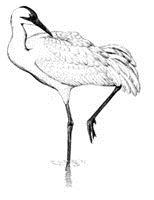North American Crane Working Group

Proceedings of the North American Crane Workshop
Date of this Version
2001
Document Type
Article
Citation
Olsen, Glenn H. H., Hendricks, Melina M., and Dressler, Lindsay E. Hematological and serum chemistry norms for sandhill and whooping cranes. In: Ellis, David H., ed., Proceedings of the Eighth North American Crane Workshop, 11–14 January 2000, Albuquerque, New Mexico (Seattle, Wash: North American Crane Working Group, 2001), pp. 178-184.
Abstract
The nonnal values used as a diagnostic tool and for comparison of cranes were established in the early 1970's. In that early study, no effort was made to look at factors such as age, sex, or subspecies. In addition, during the early study disease problems (primarily disseminated visceral coccidiosis) and nutritional problems were undiagnosed and uncontrolled. For 2 years during the annual health examinations of cranes at the USGS Patuxent Wildlife Research Center (patuxent), we collected blood from healthy cranes for analysis. We found significant differences between the values reported from the 1970's and the values seen in this study for 8 blood parameters for Florida sandhill cranes (Grus canadensis pratensis), 6 blood parameters for greater sandhill cranes (G. c. tab ida), and 6 blood parameters for whooping cranes (Grus americana). In addition, there were significant differences for some hematology and serum chemistry values based on the age of the cranes.
Included in
Behavior and Ethology Commons, Biodiversity Commons, Ornithology Commons, Population Biology Commons, Terrestrial and Aquatic Ecology Commons


Comments
Reproduced by permission of the North American Crane Working Group (NACWG).